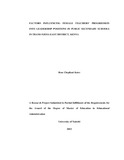| dc.description.abstract | The purpose of the study was to investigate the factors influencing female
teachers’ progression to leadership position in public secondary schools in Trans-
Nzoia East District, Kenya, The objectives were to assess female teachers’
academic qualification, cultural beliefs, female teachers’ attitude towards
leadership roles and gender roles in relation to their progression into leadership of
public secondary schools in the district. The study was based on the equity theory
of leadership which attempts to explain relational satisfaction in terms of
perceptions of fair distribution of resources within interpersonal relationship. The
study adopted a descriptive survey design. The target population of the study
comprised of 52 public secondary schools, 52 principals, 408 teachers and 1
Educational Officer. The sample size comprised of 14 mixed public secondary
schools in Trans-Nzoia East district. A sample of 1 DEO, 14 principals and 130
teachers was used for the study. An interview guide for the DEO and two
questionnaires were used to collect data. Test- retest method was used to test the
reliability of the tools. All the 14 head teachers’ questionnaires (100%) and 130
teachers questionnaires (95.6%) were returned. Thus, a questionnaire return rate
of 96% was achieved which was deemed very good for data analysis.
The major findings of the study revealed that there were ten male principals
(71.8%) and four female principals (28.2%). The study findings also indicated
that academic qualification and experience are no longer a hindrance to women
appointment to leadership positions in public secondary school. Cultural beliefs,
values and practices contribute to low participation of women in leadership in
public secondary schools. Gender roles interfere more with women’s performance
of school duties as compared to male teachers. The findings further established
that female teachers have a negative attitude towards leadership roles and
therefore, are reluctant to apply for leadership positions.
In the light of the research findings the researcher made the following
recommendations; Although social norms and traditional mind-sets are difficult to
change over a short time the collaboration efforts involving stakeholders beyond
education should be encouraged and sustained for continued progress towards
gender equality in the society. The government through the Teachers’ Service
Commission should motivate female teachers to leadership through incentives.
The Ministry of Education should encourage in-service courses on educational
management to create awareness to all teachers on administrative roles. The study
suggested that a study should be carried out to investigate the relationship
between gender and leadership styles. | en |

